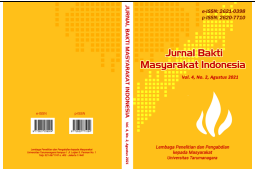MEMBANGUN SOCIAL NURTURANCE DI KALANGAN REMAJA DALAM RANGKA MENCEGAH KEKERASAN TERHADAP ANAK DI SMA KOLESE LOYOLA SEMARANG
Main Article Content
Abstract
Child violence cases are increasing in Indonesia. One cause of the increase is 'lack of community involvement with families'. The community often views violence against children as a natural way of educating children by parents, so there is no need for intervention from the community. This view needs to be changed with the socialization of the concept of social nurturance that every individual in society needs to participate to help children, not solely out of obligation, but as a necessity. Without realizing it, "nurturance" or help or care for others has become one of the fundamental needs of every individual. In the context of protecting children, someone needs to take part in taking attitudes and actions, because sexual violence that is ignored will trigger various negative impacts on the child and moreover the social environment in which the child lives, including the environment in which each individual performs. Therefore, it is necessary to socialize the understanding of the context of social nurturance for SMA Kolese Loyola students as part of the community. The methodology consists of several stages, which are: identifying the problem of violence against children, preparing the proposal, obtaining the PKM implementation permit, implementing the PKM, compiling the PKM output, preparing the PKM progress report and compiling the final PKM report. The result of this PKM activity is that Loyola College High School students get new information that in fact basic human rights are not only clothing, food and shelter, but also the need to always help children when facing violence.
ABSTRAK:
Kasus kekerasan anak semakin meningkat di Indonesia. Salah satu penyebab peningkatan tersebut ialah ‘lack of community involvement with families’. Masyarakat acapkali memandang kekerasan terhadap anak adalah suatu kewajaran cara mendidik anak oleh orang tua, sehingga tidak perlu mendapat intervensi dari masyarakat. Pandangan ini perlu diubah dengan sosialisasi konsep social nurturance bahwa setiap individu dalam masyarakat perlu berpartisipasi untuk menolong anak, bukan semata-mata karena kewajiban, namun sebagai suatu kebutuhan. Tanpa disadari, ‘nurturance’ atau pertolongan atau kepedulian terhadap orang lain telah menjadi salah satu kebutuhan fundamental pada tiap individu. Dalam konteks perlindungan terhadap anak, seseorang perlu turut andil mengambil sikap dan tindakan, sebab kekerasan seksual yang dibiarkan akan memicu berbagai dampak negatif terhadap diri anak dan terlebih lagi lingkungan sosial di mana anak itu tinggal, termasuk lingkungan tempat masing-masing individu beraktivitas. Oleh karena itu, diperlukan adanya sosialisasi pemahaman mengenai konteks social nurturance terhadap anak-anak SMA Kolese Loyola sebagai bagian dari masyarakat. Metode pelaksanaan PKM terdiri dari beberapa tahapan, yaitu tahap penggalian permasalahan kekerasan terhadap anak, tahap penyusunan proposal, tahap pengurusan izin pelaksanaan PKM, tahap pelaksanaan PKM, tahap penyusunan luaran PKM, tahap penyusunan laporan kemajuan PKM dan tahap penyusunan laporan akhir PKM. Hasil dari kegiatan PKM ini adalah siswa SMA Kolese Loyola mendapatkan informasi baru bahwa sesungguhnya hak dasar manusia bukan hanya sandang, pangan dan papan, tetapi juga kebutuhan untuk senantiasa membantu anak apabila menghadapi kekerasan
Article Details
Section
This work is licensed under a Jurnal Bakti Masyarakat Indonesia https://creativecommons.org/licenses/by-nc-sa/4.0/
How to Cite
References
Bester, J. & Kodish, E. (2017). Childen are not the property of their parents: the need for a clear statement of ethical obligations and boundaries. The American Journal of Bioethics, 17(11) Chamberlin, M. S. B. (2014). What causes child abuse? citizens identify causes of child abuse and suggest prevention strategies. Journal of Sociology and Social Work, 2(1).
Chandra, E. (18 Januari 2019). Angka kekerasan terhadap anak selama 2018 meningkat, ada pertambahan sekitar 300 kasus. Tribun Jabar. https://jabar.tribunnews.com/2019/01/18/
angka-kekerasan-terhadap-anak-selama-2018-meningkat-ada-pertambahan-sekitar-300- kasus.
Fayaz, I. (2019). Child abuse: effects and preventive measures. The International Journal of Indian Psychlogy, 7(2).
Ikhsan, A. (14 Oktober 2020). Kekerasan terhadap anak meningkat selama pandemi, dosen IPB jelaskan penyebabnya. Kompas.https://regional.kompas.com/read/2020/10/14/18175921/ kekerasan-terhadap-anak-meningkat-selama-pandemi-dosen-ipb-jelaskan?page=all.
Murray, H. A. (2018). Exploration in personality. Oxford University Press. Pradhitama, S. (2015). Kekerasan terhadap anak dalam keluarga dalam perspektif fakta sosial. Jurnal Media Neliti. https://media.neliti.com/media/publications/164648-ID-kekerasanterhadap-anak-dalam-keluarga-d.pdf.
Rozak, P. (2013). Kekerasan terhadap anak dalam rumah tangga dalam perspektif hukum islam.
Jurnal SAWWA, 9(1). Tuapattinaja, J. M. R. & Saragih, J. I. (2016). Gambaran profil epps pada mahasiswa USU. Jurnal Psikologia, 11. World Health Organization. (8 Juni 2020). Child maltreatment. https://www.who.int/newsroom/fact-sheets/detail/childmaltreatment#:~:text=It%20includes%20all%20types%20of,of%20 responsibility%2C%20trust%20or%20power

